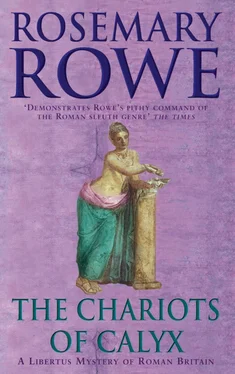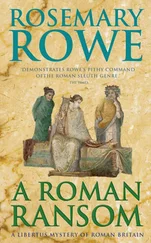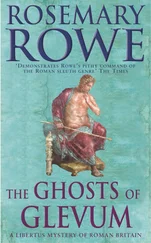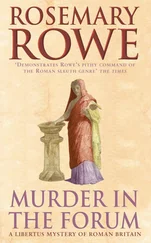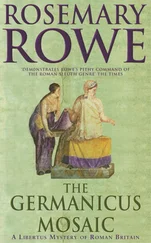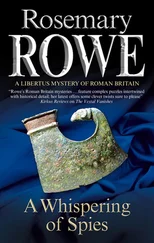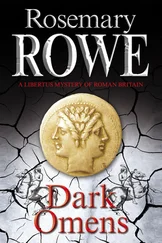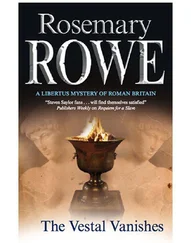Rosemary Rowe - The Chariots of Calyx
Здесь есть возможность читать онлайн «Rosemary Rowe - The Chariots of Calyx» весь текст электронной книги совершенно бесплатно (целиком полную версию без сокращений). В некоторых случаях можно слушать аудио, скачать через торрент в формате fb2 и присутствует краткое содержание. Год выпуска: 2002, ISBN: 2002, Издательство: Headline, Жанр: Исторический детектив, на английском языке. Описание произведения, (предисловие) а так же отзывы посетителей доступны на портале библиотеки ЛибКат.
- Название:The Chariots of Calyx
- Автор:
- Издательство:Headline
- Жанр:
- Год:2002
- ISBN:9781472205087
- Рейтинг книги:5 / 5. Голосов: 1
-
Избранное:Добавить в избранное
- Отзывы:
-
Ваша оценка:
- 100
- 1
- 2
- 3
- 4
- 5
The Chariots of Calyx: краткое содержание, описание и аннотация
Предлагаем к чтению аннотацию, описание, краткое содержание или предисловие (зависит от того, что написал сам автор книги «The Chariots of Calyx»). Если вы не нашли необходимую информацию о книге — напишите в комментариях, мы постараемся отыскать её.
The Chariots of Calyx — читать онлайн бесплатно полную книгу (весь текст) целиком
Ниже представлен текст книги, разбитый по страницам. Система сохранения места последней прочитанной страницы, позволяет с удобством читать онлайн бесплатно книгу «The Chariots of Calyx», без необходимости каждый раз заново искать на чём Вы остановились. Поставьте закладку, и сможете в любой момент перейти на страницу, на которой закончили чтение.
Интервал:
Закладка:
I sat down where he had indicated, and said carefully, ‘I heard that there had been an unexpected death.’
He eyed me shrewdly. ‘A death, certainly. Of one of the city’s senior officials too. How unexpected it is I could not say. There have been so many plots and counter-plots lately — as you know, since you so brilliantly helped to uncover one.’
There was no decently modest answer to that, so I said nothing, and merely attempted to look at once grave and deeply interested. In fact, every alarm-goose in my head was already hissing urgent warnings. Ten minutes ago I had been concerned lest I had earned Pertinax’s disapproval — now it was his approval that worried me still more. And with reason. I had been lucky to escape from that last investigation with my life. If the governor was about to ask for my help — as I had a terrible premonition that he was — I could soon find myself playing political ludus latinorum again, with my head once more as the stake.
A stake that I would be very likely to lose. I could see that. The penalties for killing a senior public official are so horrible that people will do a great deal to avoid facing them. Like murder me, for instance; to anyone who has already disposed of a man of wealth and influence, the life of a mosaic-making ex-slave would mean very little. On the other hand, it means a lot to me. I have no wish to find myself prematurely designing pavements for Pluto. And yet I could hardly ignore the orders of the governor.
‘What kind of man was he?’ I asked brightly, as soon as Pertinax had finished outlining what he knew. ‘This Caius Monnius Loveinius? Do you know if he had enemies?’ If I asked enough questions immediately, I reasoned, I might deflect His Excellence from issuing any specific orders or from asking any favours, which — coming from the governor — would amount to very much the same thing.
The governor looked at me keenly. ‘Enemies? Half of Londinium held grudges, I imagine. He was frumentarius for the city — and doing very well out of it.’
I nodded glumly. ‘I see.’
I did see. No man ever became a frumentarius in the hope of making friends. When one individual is responsible for the constant provision, warehousing and sale of corn, even for a smallish town, resentments are inevitable. Here, in a large city, it must be a thousand times worse. The best a frumentarius can hope for is to avoid being dragged in effigy on the hook around the streets — by the inhabitants every time there is a famine, and by the farmers and carters whenever there is a glut. No one loves a corn officer.
‘Only half Londinium has a grudge?’ I said, with a smile.
Pertinax did not acknowledge the jest. ‘Everyone needs grain, and it is impossible for a frumentarius to please everybody.’
No doubt it is an unenviable job, given the British vagaries of wind and weather. Doubtless, too, there are corn officers who are ornaments to their office, trying to ensure good-quality grain at a reasonable price to all comers, and whose accumulation of golden treasure is limited to the edible variety in their granaries. I can only report that I have never met one. On the other hand everyone, from baker to town official, cavalryman to cook, will seek to bribe and flatter a frumentarius , at least to his face. As the governor so rightly said, everybody needs grain.
‘Well,’ I said, ‘he isn’t doing so well out of it any more.’
Pertinax regarded me severely, rebuking my unseemly levity with a glance. It reminded me of schoolmasters I had known. I remembered that Pertinax had, in fact, once been a teacher of grammar — before his father’s patron found him a place in the cohorts and set him on his rise to power. He must have been a formidable paedagogus .
He sounded like a schoolteacher now, weary and patient. ‘Libertus, you know that I have applied to be relieved of this appointment and be posted elsewhere?’
I nodded. I did know. The proposed journey to Eboracum was to have been part of his farewell procession around the major cities of the province. ‘The Insula Britannica will miss you, Mightiness.’ I meant it. To have a just and noble governor is every subject’s dream. To have an intelligent and upright one — however severe he might be with wrongdoers — is an unusual privilege.
‘Then, my friend, spare me your wit and use that patternmaker’s brain to better purpose. Assist me to leave the province in good order. If the provincial council refuses to pass the customary vote of thanks on my departure, there will be an imperial enquiry into my governorship. That could be serious. The Emperor is becoming more’ — he glanced towards the guards, but they stood motionless and impassive as the statues which surrounded them — ‘more — shall we say — “individual” at every turn. For instance, did you know that as well as renaming Rome Commodiana in his own honour, he has now decreed that the months of the year are also to be changed? August is to be Commodus, September Hercules, October Invictus. . and November has disappeared in favour of “Exsuperatorius” — all named after His Imperial Divinity, of course.’
I had not heard of this latest excess, although the Emperor’s increasingly ‘individual’ behaviour was whispered throughout the Empire. I tried to make light of it. ‘At least the changes will keep the imperial scribes busy.’
‘He is becoming less and less forgiving of any kind of civil unrest,’ Pertinax went on, as if I hadn’t spoken. ‘He sees it as dissent against himself — and the local governor is held responsible. This murder would not look well at an enquiry. This is not a joking matter, Libertus. My future as well as yours may depend on it.’
I could see why the governor was alarmed and I hastened to redeem myself by sounding businesslike. ‘The question is, Mightiness, whether any of these grudges that you speak of were personal — directed at Caius Monnius in particular — or were merely irritation with the corn taxes in general.’
Pertinax nodded thoughtfully. He began fanning imaginary flies from his face with the horsehair whisk. ‘They might be both, I imagine. Caius Monnius introduced some new measures which have won him little popularity: big drying houses by the river, for instance — the local landowners didn’t like that — and his system of compulsory loans for the corn trade almost caused riots in the street.’
‘Compulsory loans?’ I did not live in Londinium and this was the first time I had heard of this.
‘If a man wants money for seed corn, or to build a warehouse-granary, or merely to purchase large quantities of grain, he is now obliged to borrow it from the town treasury — at a high rate of interest, naturally.’
‘Part of which finds its way into Caius Monnius’ private coffers?’
The governor almost smiled. He toyed with the fly-whisk, and his tone was ironic as he said, ‘I imagine so. I could not really say. That is a matter for the city, not the state. As provincial governor, it is hard for me to intervene, unless specific charges are brought against him — as, of course, they never have been.’
Of course they hadn’t. A man would have to be exceedingly desperate, or influential, to bring an accusation like that against the city corn officer. For one thing, under Roman law, there can be no trial unless the accused can be physically brought before the courts — difficult with a wealthy, influential, well-guarded man like Caius Monnius. For another thing, the accuser still has to eat. As I said, everyone needs grain.
One thing surprised me, however. I had always regarded the Roman governor — second in command only to the Emperor in matters relating to the province — as having almost unlimited powers. Of course, like every other major city, Londinium was a republic in its own right, with its own urban administration, but it had never occurred to me that Pertinax might have to tread with care in order not to offend the sensibilities of the civic council.
Читать дальшеИнтервал:
Закладка:
Похожие книги на «The Chariots of Calyx»
Представляем Вашему вниманию похожие книги на «The Chariots of Calyx» списком для выбора. Мы отобрали схожую по названию и смыслу литературу в надежде предоставить читателям больше вариантов отыскать новые, интересные, ещё непрочитанные произведения.
Обсуждение, отзывы о книге «The Chariots of Calyx» и просто собственные мнения читателей. Оставьте ваши комментарии, напишите, что Вы думаете о произведении, его смысле или главных героях. Укажите что конкретно понравилось, а что нет, и почему Вы так считаете.
